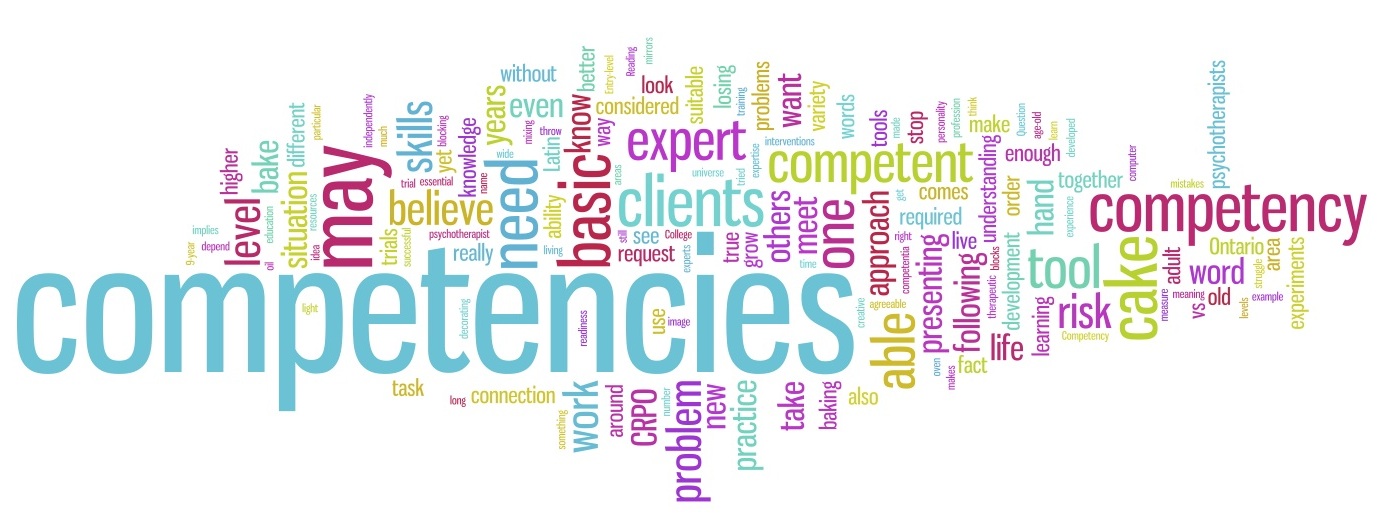
Over the past few years there has been a lot of discussion in the Ontario community of psychotherapists about competencies and their value. The newly forming College of Registered Psychotherapists of Ontario (CRPO) has developed standard entry-to-practice competencies that are the guiding light for schools in the development of their training programs and for the registration regulation of the CRPO itself. For some these competencies didn’t articulate clearly enough when one is considered ready to practice or the competencies were seen as too basic. For yet others the same competencies seemed too strict and forbidding. And for yet some others the whole idea of evaluating readiness to practice through competencies vs. education, i.e. a degree, was just incomprehensible.
The Transitional Council of the CRPO had to struggle with a an age-old question: what is it that makes us competent as psychotherapists? What is it that leads to successful therapeutic interventions and to lasting results for our clients? And is there a difference in the meaning of “competent” if we are talking about a new graduate vs. a veteran of 20 years practice?
The word “competency” comes from the Latin competentia and means “meeting together, agreement, symmetry”. In other words, competency is really about the ability to meet — the presenting problem, the request of the other, the personality of the other, the situation as it is. We are considered competent when we can meet what is presented too us in an appropriate, suitable, and agreeable way, when our approach mirrors the request in some way.1
In pretty much every life situation there are basic skills we are required to have. We need to be able to communicate with others if we want to live in relationship. We need to have a suitable level of computer skills if we want to work in an administrative profession. We have to have some basic understanding of measures and ingredient lists if we want to bake a cake. We can, in fact, not really function well and independently in this world without some competencies in some areas of life.
But the levels of competency required vary greatly. They depend on a wide variety of variables: our age / maturity; the level of our engagement in the task at hand; the number of people / resources we can use to complete the task at hand to name but a few.
Take the example of baking a cake:
When I am 9 years old it will be a great achievement if I bake a box cake without help. The competencies I need? Reading (the instructions), being able to measure correctly (water / oil), having basic motor skills (mixing it all together, filling the dough in a baking pan), following through (sticking around to take the cake out of the oven when the bell rings).
When I’m an adult I may have higher expectations on myself. My competencies may have grown to being able to make a cake from scratch following a recipe. I still need the same competencies but on a higher level — and I may need some additional competencies in free-style decorating and creative design. As an alternative, I may be living with another adult who is a pastry chef and I won’t even need the same competencies I had as a 9-year old because I will never be in the position of having to bake a cake again.
The same holds true for our work. Entry-level competencies in any area that is new are basic competencies: identifying the right tool / problem / approach; introducing and following through with a basic understanding of the tool / problem / approach; avoiding the creation of more problems or doing harm in the process of doing the work. Master-level competencies in that same area look different: being able to see the intricate connection between different presenting problems, being able to use a variety of tools (or a variation of a tool) in order to better meet the presenting problem, turning potentially harmful situations into learning moments, etc.
We move from one level of competency to the next by working diligently on our skills, our craft, and our own blocks and fears. If we get stuck in believing that we are not competent enough to even try to work with a particular tool, we can’t grow, we can’t become more competent. In order to do that we have to take the risk of making a mistake, of not doing it perfectly the first time around. We have to risk having to make amends or having to admit that we don’t know something. We have to risk not looking like the “expert” as which our clients may see us — or so we believe.
On the other hand, if we think that we know more than we actually do we also are blocking the development of our competency. If we believe that we can handle any situation the universe and our clients throw at us with that one tool that we have mastered, we won’t allow ourselves to look for new tools, better approaches, or even a more personal connection to our clients. If we believe that we are über-competent we won’t take the risk to grow and shake that “expert” image.
The word expert comes from the word experience which is Latin (experientia) for “a trial, proof, experiment; knowledge gained by repeated trials”.2 In other words, an expert is someone who has gone through several trials and experiments, has failed and tried again, and has arrived at some knowledge through that. That also implies that the true expert knows that he / she doesn’t know everything, that as long as we live there will be more to learn, more mistakes to be made, more experiments to be conducted.
Our competencies can’t ever stop developing. If they do we may have fallen prey to a false sense of expertise, one that tells us that it is okay to stop growing, stretching, enquiring, learning. If that happens we may, in fact, be losing competence because we may be losing our ability to listen deeply, to be curious about life and our clients, and to accept that our clients are the experts on their lives — and that is one competency that I believe to be essential for any psychotherapist.
1 Online Etymology Dictionary: http://www.etymonline.com/index.php?allowed_in_frame=0&search=competency&searchmode=none
2 Online Etymology Dictionary: http://www.etymonline.com/index.php?term=experience&allowed_in_frame=0

